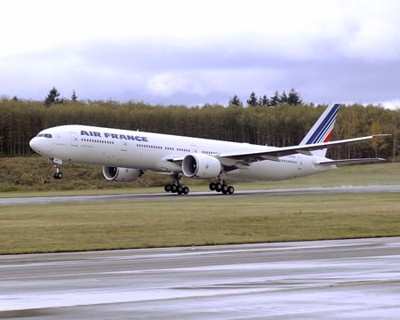Mon, Feb 08, 2010
Finds "Strong Financial Incentives" For Use Of Alternative
Fuel
 EQ2, which
describes itself as "a sustainability economics company," released
a report Thursday examining the development of sustainable,
carbon-neutral biofuels for aircraft, and a critical study of the
economic and climate impacts of the aviation industry as it moves
towards the large-scale adoption of biofuels. The report finds the
industry's reliance on fossil fuels has caused it to become
extremely vulnerable to changes that will go into effect in 2012,
when the EU Emissions Trading Scheme applies to all flights into or
out of Europe, and puts a direct cost on its carbon emissions.
EQ2, which
describes itself as "a sustainability economics company," released
a report Thursday examining the development of sustainable,
carbon-neutral biofuels for aircraft, and a critical study of the
economic and climate impacts of the aviation industry as it moves
towards the large-scale adoption of biofuels. The report finds the
industry's reliance on fossil fuels has caused it to become
extremely vulnerable to changes that will go into effect in 2012,
when the EU Emissions Trading Scheme applies to all flights into or
out of Europe, and puts a direct cost on its carbon emissions.
With a predicted 15% and 30% consumption of biofuel in 2020 and
2030, the report predicts the EU aviation industry will be able to
avoid 35 million tons of CO2 emissions in 2020 and 100 million tons
in 2030. Such a reduction in emissions is equivalent to $2.01 in
savings on carbon expense in 2020, and $5.84 billion in 2030. Based
on the same assumption of aviation biofuel consumption, the global
aviation industry could be able to avoid 129 million tons of CO2
emissions in 2020, and up to 420 million tons in 2030.
The report's findings show strong financial incentives, based on
the current EU Emissions Trading Scheme price for carbon in 2012 of
$20.50, and 2009 average jet fuel price of $1.69 per gallon, every
gallon of jet fuel burned would incur carbon costs of an additional
$0.21, which is a total cost of $1.34 billion across the industry.
Projecting to 2020 and 2030, the industry will face carbon costs of
$9.56 billion and $19.48 billion, respectively. This is a
premium that would not apply to carbon-neutral biofuel, which will,
the report says, help make it more cost competitive.

"The aviation industry must embrace the new realities
surrounding climate change," said Steve Burt, CEO of EQ2. "Our
report demonstrates the clear benefits of adaptation, with
renewable fuel being the current best option the industry has
against future economic and regulatory pressures."
More News
Light Gun A handheld directional light signaling device which emits a brilliant narrow beam of white, green, or red light as selected by the tower controller. The color and type of>[...]
"The journey to this achievement started nearly a decade ago when a freshly commissioned Gentry, driven by a fascination with new technologies and a desire to contribute significan>[...]
Aero Linx: JAARS, Inc. For decades now, we’ve landed planes on narrow rivers and towering mountains. We’ve outfitted boats and vehicles to reach villages that rarely se>[...]
"Our driven and innovative team of military and civilian Airmen delivers combat power daily, ensuring our nation is ready today and tomorrow." Source: General Duke Richardson, AFMC>[...]
Aircraft Conflict Predicted conflict, within EDST of two aircraft, or between aircraft and airspace. A Red alert is used for conflicts when the predicted minimum separation is 5 na>[...]
 ANN's Daily Aero-Term (04.20.24): Light Gun
ANN's Daily Aero-Term (04.20.24): Light Gun Aero-News: Quote of the Day (04.20.24)
Aero-News: Quote of the Day (04.20.24) ANN's Daily Aero-Linx (04.21.24)
ANN's Daily Aero-Linx (04.21.24) Aero-News: Quote of the Day (04.21.24)
Aero-News: Quote of the Day (04.21.24) ANN's Daily Aero-Term (04.21.24): Aircraft Conflict
ANN's Daily Aero-Term (04.21.24): Aircraft Conflict




